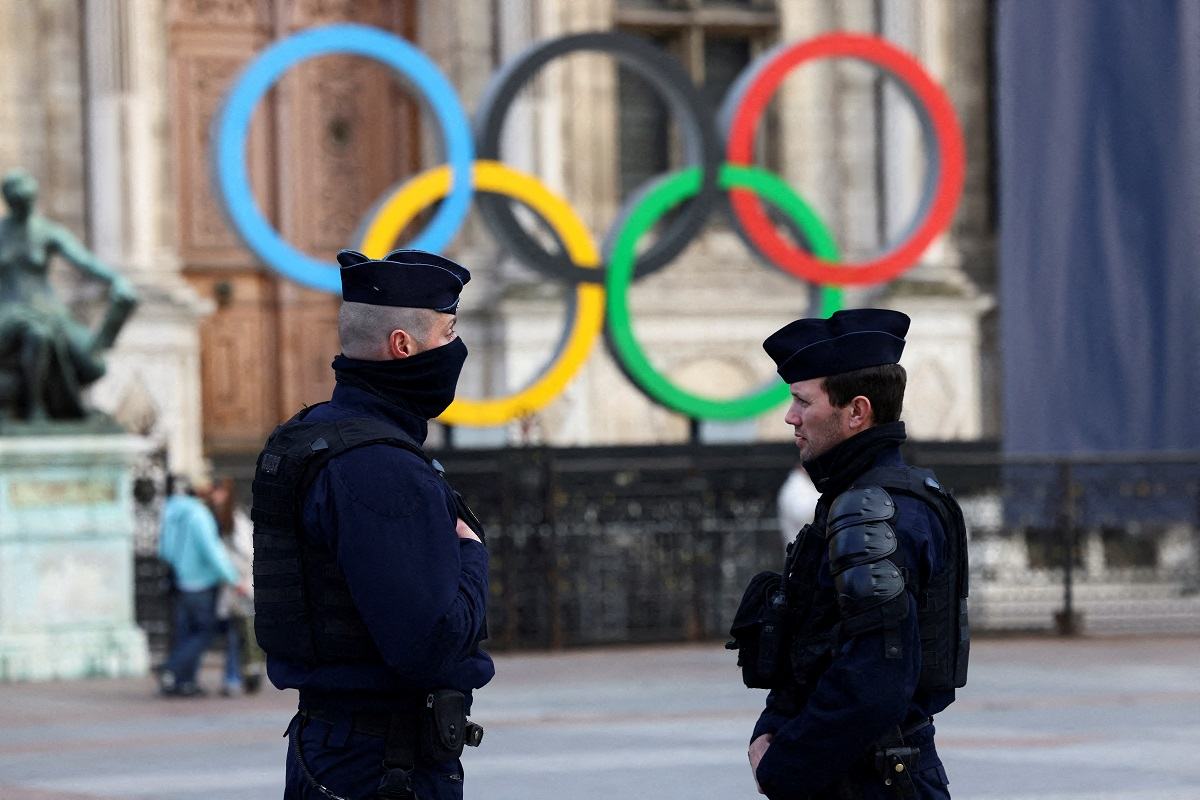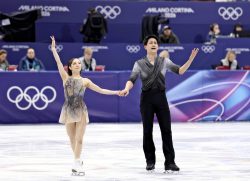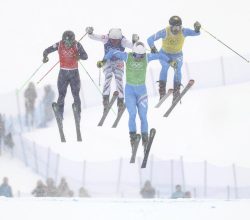
French police officers stand guard near the Olympic rings which are displayed for the Paris 2024 Summer Games in Paris, France, March 21, 2023.
13:03 JST, June 4, 2024
LONDON (Reuters) – Russia has stepped up an online disinformation campaign which takes aim at France and the upcoming Paris Olympics, Microsoft said in a blog post published on Sunday.
The campaign, which includes falsified news websites and a feature-length documentary film, is specifically designed to denigrate the reputation of the International Olympic Committee (IOC) and create the impression that the summer games will be marred by violence, Microsoft said.
“The most worrisome disinformation advanced by pro-Russian actors has sought to impersonate militant organizations and fabricate threats to the Games amidst the Israel-Hamas conflict,” the company said.
Russia’s embassy in London did not respond to an emailed request from Reuters for comment.
Microsoft said it had found instances in late 2023 of known Russian disinformation actors posting “likely digitally generated” images purporting to show graffiti in Paris which threatened violence against Israelis attending the Olympics, some of which referenced the 1972 killings by Palestinian militants of 11 Israeli Olympians in Munich.
The campaigns were carried out by two Russian-backed entities Microsoft said it tracks as Storm-1679 and Storm-1099, which is also known as “Doppleganger.” Using an array of 15, falsified, French news websites, Doppleganger amplified Russian claims of IOC corruption and potential violence at the games, Microsoft said.
In June last year, the group Microsoft tracks as Storm-1679 produced a feature-length film called “Olympics Has Fallen” which the company said was designed to disparage IOC leadership.
The film, Microsoft said, was narrated with fake AI-generated audio of American actor Tom Cruise, and used the personalized video message website Cameo to trick other U.S. celebrities into endorsing the film.
The effort “clearly signaled the content’s creators committed considerable time to the project and demonstrated more skill than most influence campaigns we observe,” Microsoft said.
“The Kremlin’s propaganda and disinformation machine is unlikely to hold back in leveraging its network of actors to undermine the Games as the Olympics draw near,” the company added.
The campaign increased late last year, following the decision by the IOC to allow Russian athletes to compete in the games as neutral competitors, Microsoft said.
Top Articles in Sports
-

Milano Cortina 2026: Figure Skaters Riku Miura, Ryuichi Kihara Pair Win Gold; Dramatic Comeback from 5th Place in SP
-

Milano Cortina 2026: Kokomo Murase Comes Out on Top After Overcoming Obstacles, Aiming for Greater Heights in Competition
-

Milano Cortina 2026: Riku Miura, Ryuichi Kihara Clinch Japan’s 1st Gold in Pairs Figure Skating, Rebounding from Disappointing Short Program
-

Milano Cortina 2026: Olympics-Torch Arrives in Co-Host Cortina on Anniversary of 1956 Games
-

Milano Cortina 2026: Japan’s Athletes Arrive in Italy for Milano Cortina Winter Olympics; Other Athletes to Arrive from Now
JN ACCESS RANKING
-

Japan PM Takaichi’s Cabinet Resigns en Masse
-

Japan Institute to Use Domestic Commercial Optical Lattice Clock to Set Japan Standard Time
-

Israeli Ambassador to Japan Speaks about Japan’s Role in the Reconstruction of Gaza
-

Man Infected with Measles Reportedly Dined at Restaurant in Tokyo Station
-

Videos Plagiarized, Reposted with False Subtitles Claiming ‘Ryukyu Belongs to China’; Anti-China False Information Also Posted in Japan





















